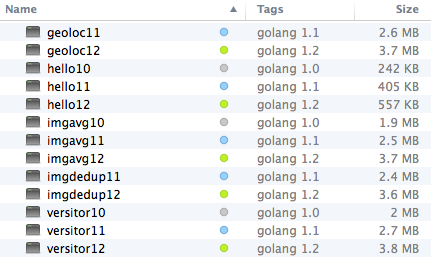Go Binary Sizes Are Growing out of Control
Update 2019-07-17: I have released a follow up post Go Binary Sizes Are Relatively Stable which speaks on what's happened in the time since this was published.
Note: This is not intended as a "Go Sucks" post. I love Go. I am not saying the developers are lazy or dumb or any of the things Reddit has implied. I am not implying I could build a better compiler. Rob Pike and the Go team are geniuses whom I look up to. The tone of this was intended to be a light "man I wish binaries were smaller" but that is not how Reddit seemed to take it. Also, the title is hyperbole and not meant to literally mean no one has control over it.
I started toying with Go about two years ago before the 1.0 release. I love the language, it meets me in a comfortable place between C and a scripting languages like PHP. I find it fun to write and an easy way to bust out performant code quickly. The binaries for a simple Hello, 世界 were large though, around 55KB. I figured this was something the Go team would work out later; it is a lot of space just to send a string to standard out.
With the release of Go 1.0 though, I noticed the binary size had grown slightly to 242KB. Discouraging but livable. I was quite hopeful with the 1.1 release, but it had actually nearly doubled in size coming out to a whopping 405KB. Then this morning I compiled it again in the newly release 1.2 and to my horror the ever simple program came out to 557KB.
What on earth is going on in that binary? I am no expert on compilers but I would imagine the vast majority of what is in there is completely unnecessary and could be optimized out. Changing the script to "Hello, World" rather than Go's flaunted unicode version has zero effect on binary size, as one would expect but I was hopeful.
For reference the complete source of my Hello, 世界 follows. Using fmt comes out even larger.
package main
func main() {
println("Hello, 世界")
}Here is a collection of binaries compiled in different versions of Go. Notice how imgavg grows from 1.9MB to 3.7MB. My applications are all small tools. I can only imagine the effect this has an already large application.

I really hope something is done about this. I would love to see tiny (<32KB) binaries from Go but right now that doesn't seem to be a priority for them. The fact that Hello, 世界 fills half a floppy means the language is not be useful for lighter or embedded environments.
As noted in the header there is an addendum to this:
Comment by: ahm on
https://code.google.com/p/go/issues/detail?id=6853
Comment by: Thibaut Colar on
If you really care about the size that much, then you could probably dynamically link the program (instead of statically), but I've never bothered to do that.
Comment by: Terry A. Davis on
Comment by: Random Stranger on
Comment by: Name on
Comment by: Tyler Mace on
Comment by: Linker on
Comment by: James Henstridge on
Comment by: Dave Cheney on
Go binaries are always going to be larger that the same *simple* program written in C because almost all the C functions are provided by libc.so at runtime.
As many posters have already pointed out, once your Go application starts to *do* something, like talk to the network using TLS or talk to a database, sure the Go binary size increases, but comparable to the same program written in C with _all the included libraries compiled statically_.
Finally, please don't strip your binaries; it isn't supported, isn't tested and is known to produce broken executables.
If you have a problem with the previous statement, the correct place to request this is golang.org/issue.
Comment by: Martin on
Because: The size of executables of small programs doesn't matter, because small programs are only examples or test code. And as soon as your program gets meaningful big and complex go's binaries don't get much bigger (maybe 1-2MB on Win). And as long as we don't talk about 20MB+ you're still small than every Java application...
Comment by: Ahmed on
go build -ldflags "-s" hello.o
Comment by: Smithb163 on
Comment by: carlok on
On other note, we are currently seeking experts to integrate parts of our infrastructure using hieroglyphics and cuneiform respectively. Generous salary (choice of babylonian or egyptian tetradrachms), senior developers are issued personal slaves !!!
Comment by: Timofey on
It help to contain many small go-programs in a binaries with only one overload by libraries size.
It is good for a lot of small utilities.